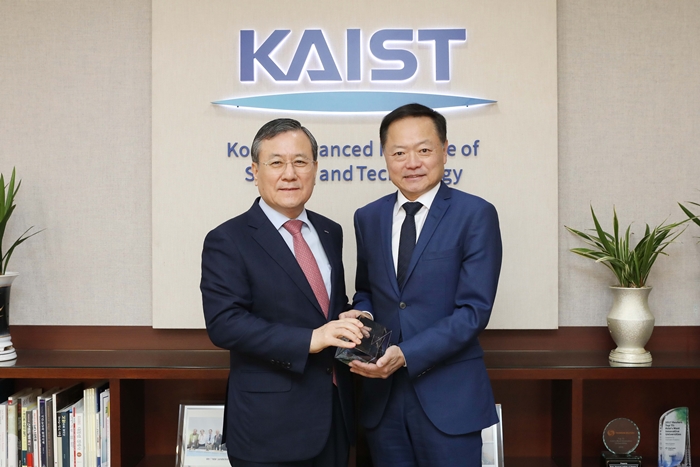event

< Director Steve Ahn (Right) >
Steve Ahn, the Director of Startup KAIST, donated one hundred million KRW of development fund to his alma mater KAIST to increase entrepreneurship opportunities and nourish start-up culture on campus. Professor Ahn founded Leadis Technology Inc. in 2000, a fabless semiconductor company based in Silicon Valley that develops mobile phone sub-display applications. Leadis Technology Inc. made its stock market debut on the NASDAQ in 2004.
“KAIST produces many start-ups, however, entrepreneurial culture has yet to become a growth engine of KAIST, compared to education and research. Through invigorating entrepreneurial spirit and revitalizing start-up activities, KAIST should reclaim its leadership role in creating decent jobs and fuelling economic growth and competitiveness at home and abroad,” he said during the donation ceremony last month.
He added, “I am forever grateful to my alma mater KAIST for having provided me with a quality education. It was a valuable asset that helped me gain an opportunity to nurture the up-and-coming, next-generation scholars as a professor at KAIST. I decided to make this donation hoping that KAIST students will be given more entrepreneurship opportunities, and a healthy start-up ecosystem will be accelerated beyond KAIST.”
Director Ahn earned his bachelor’s degree in metallurgy from Seoul National University, followed by a master’s degree in materials engineering from KAIST. He received another master's degree in electrical engineering, and was granted a doctorate in materials engineering from Stanford University.
He has been mentoring start-up activities at Startup KAIST since 2014, and serving as the principal professor at K-School since 2016. From these activities, he was recognized for his academic achievements and committed leadership, which led him to be appointed as the Director of Startup KAIST in March 2019.
(END)
-
research Editing Parkinson's Disease – KAIST Makes World's First Discovery of an Inflammatory RNA Editing Enzyme
< Professor Minee Choi of the Department of Brain and Cognitive Sciences (top left). Professor Sonia Gandhi (top right) and Professor Klenerman of the University College London (bottom right) > Parkinson's disease (PD) is a neurodegenerative disorder in which the α-synuclein protein abnormally aggregates within brain cells, causing neuronal damage. Through international collaboration, researchers at KAIST have revealed that RNA editing plays a crucial role in regulating neuroi
2025-05-02 -
event KAIST Art Museum Showcases the Works of Van Gogh, Cy Twombly, and More at "The Vault of Masterpieces"
KAIST (President Kwang Hyung Lee) opened a special exhibition "The Vault of Masterpieces" featuring the architects of the Gallerist Hong Gyu Shin, who is active in New York, on April 29th. Since its opening in December 2024, the KAIST Museum of Art, which has mainly exhibited works from its own collection, has boldly invited internationally renowned gallerist Shin Hong-gyu to hold its first full-scale special exhibition, displaying a large number of his collections in the center of the campus
2025-04-30 -
research KAIST sends out Music and Bio-Signs of Professor Kwon Ji-yong, a.k.a. G-Dragon, into Space to Pulsate through Universe and Resonate among Stars
KAIST (President Kwang-Hyung Lee) announced on the 10th of April that it successfully promoted the world’s first ‘Space Sound Source Transmission Project’ based on media art at the KAIST Space Research Institute on April 9th through collaboration between Professor Jinjoon Lee of the Graduate School of Culture Technology, a world-renowned media artist, and the global K-Pop artist, G-Dragon. This project was proposed as part of the ‘AI Entertech Research Center’ be
2025-04-10 -
event KAIST, Galaxy Corporation Hold Signboard Ceremony for ‘AI Entertech Research Center’
KAIST (President Kwang-Hyung Lee) announced on the 9th that it will hold a signboard ceremony for the establishment of the ‘AI Entertech Research Center’ with the artificial intelligence entertech company, Galaxy Corporation (CEO Yong-ho Choi) at the main campus of KAIST. < (Galaxy Corporation, from center to the left) CEO Yongho Choi, Director Hyunjung Kim and related persons / (KAIST, from center to the right) Professor SeungSeob Lee of the Department of Mechanical Engineer
2025-04-09 -
research KAIST Identifies Master Regulator Blocking Immunotherapy, Paving the Way for a New Lung Cancer Treatment
Immune checkpoint inhibitors, a class of immunotherapies that help immune cells attack cancer more effectively, have revolutionized cancer treatment. However, fewer than 20% of patients respond to these treatments, highlighting the urgent need for new strategies tailored to both responders and non-responders. KAIST researchers have discovered that 'DEAD-box helicases 54 (DDX54)', a type of RNA-binding protein, is the master regulator that hinders the effectiveness of immunotherapy—opening
2025-04-08